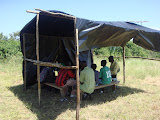Since I’ve been back in the States, I’ve been making lists of what I should remember to do differently next time. I thought I would share for anyone who’s planning to do similar work in a similar place.
I’ll start with the most practical. One of the biggest surprises in Muhuru was how much time I spent figuring out how to do seemingly simple tasks. Without access to electricity, banks, and an office supply closet, I often felt lost.
7 Logistics changes I will make next time:
1) Take out plenty of cash ahead of time (a trip to the closest ATM took at least half a day).
2) Pay research staff every two weeks (not weekly); Getting correct change is not easy and not fun, so minimizing the frequency would help. For a little extra fee, I might also pay through MPESA (money transfer service associated with the cell phone company).
3) Give research staff cell phone airtime on a regular basis, and ask them to do as much scheduling and arranging logistics as possible (e.g., transportation for fieldwork). They were much better at it and more efficient… things happened much more quickly (and often less expensively) when negotiations were made in the local language.
4) Pack office supplies – tape, folders, paperclips, envelopes, etc…I’ll think ahead about what will make organization easier to make up for limited office and storage space.
5) Print and copy ahead of time.
6) Use text messages and written letters to invite people to meetings or events; communication over the phone was more difficult than in writing or in person, so scheduling based on only phone conversations often led to confusion.
7) Ask for ideas about logistical challenges (scheduling, planning, etc.) from people who are from the community before racking my brain to figure it all out. Often there were systems in place already and/or things to consider that never would have occurred to me.











